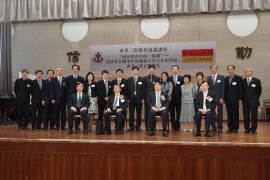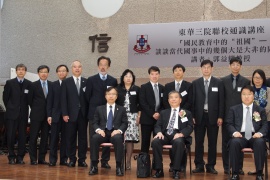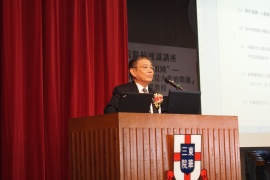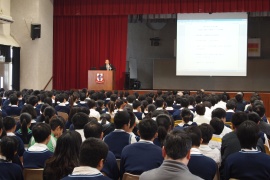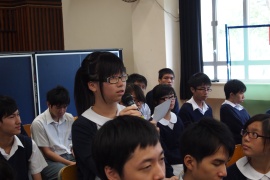TW General Education Seminar on 'Our Motherland' in National Education by Professor Y. Y. Kueh, Former Dean of Social Sciences, Lingnan University, H.K.
前香港嶺南大學社會科學學院院長郭益耀教授主持《國民教育中的【祖國】》通識專題講座
To provide TW students with a more comprehensive understanding of 'China Today' which is a compulsory module in NSS Liberal Studies (LS) and to broaden our students understanding of the development of China ever since the establishment of the People's Republic of China (PRC) in 1949 (62 years ago), Tung Wah Education Division has organized a General Education Seminar on National Education Series --- 'Our Motherland' 國民教育中的【祖國】for senior form students of our 18 secondary school on November 11, 2011. It is indeed our greatest honour to have invited a renowned academic in Chinese Studies, Professor Y. Y. Kueh, Former Dean of Social Sciences, Lingnan University, H.K. to conduct this meaningful seminar. What a precious and invaluable experience for our students!
As a most sought-after authors of Chinese Studies and Economics, Professor Keuh shared with us his researches, all the first-hand information of and insights in the major issues that made Contemporary China.(談談當代國事中的幾個大是大非的問題) Thus our students are enabled to know more about the following:
- What is in our hearts when we called the 'Motherland'?
稱呼'祖國',心情就那麼'沉重'或'彆扭'嗎?
- How can we evaluate the achievements and shortcomings ever since the establishment of PRC?
如何評價新中國建立六十年來的功過得失? - Has China been industrialized? Is China still a poverty-stricken country in the developing world?
中國是否已經成為一個工業化的國家?或仍然是一個正在發展中的貧窮國家呢? - How can we look at the 'Great Leap Forward' and the catastrophe of the 'Cultural Revolution'
amidst the recent economic take-off of China today?
經濟騰飛的大背景之下又應該如何回顧 '大躍進' 和'文革十年'的 '浩劫' 呢? - How is China compared with the 'Four Dragons of Asia'?
中國真的比不上 '亞洲四小龍' 嗎? - Is it possible to strike a balance between the economic development & achievement of China with the
Progress in 'Liberty and Human Rights'?
為什麼經濟改革的成就與 '自由民主人權' 等政治議題不容易擺平關系呢?
- What is my point of view on the June Fourth Incident?
對 '六四事件' 的問題又應該如何給個看法呢?
Professor Keuh was remarkably successful in telling big stories through collections of studies. His sharing provided a vivid insider's view of the thinking and analyses that led China to abandon central planning and seek to establish a market economy. He explained the elite's distress over the faltering economy and how Mao perceived the urgency for change. He went further to see the twists and turns of China's economic and reform policies. The Open Forum Session, students were enthusiastic to know more about China Today. Questions like the Pressurized Human Rights Movement in China, the Paradox of Communist Ideology and China Opening, China in International Power Politics, the Rise of China, Over-emphasis on Economic Issue, the Negligence on Social Issue, China's Planned Economy, China's Aging Problem, the June Fourth Incident and Personal Qualities of Chinese Citizens were raised. From Professor Keuh's response, we
- have a basic understanding of contemporary China operates in terms of the economy and politics;
- appreciate what it is like to grow up and to live in China today, and to gain an insight into the changes that are taking place in Chinese society;
- appraise the future development of China and its changing role in the international arena.
The seminar gave our students fruitful and enlightening insights into key issues of China Today which was exceptionally educational and valuable.

